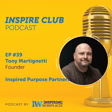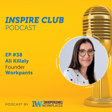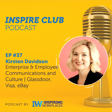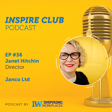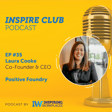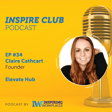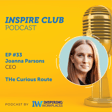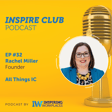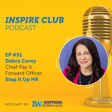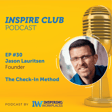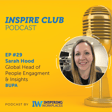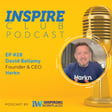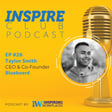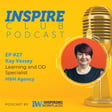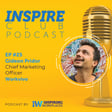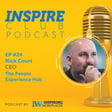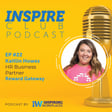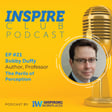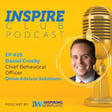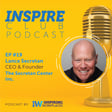Become a Creator today!Start creating today - Share your story with the world!
Start for free
00:00:00
00:00:01

Inspire Club EP #23 - Perrine Farque
In this episode we talk with Perrine Farque, Founder & Speaker at Inspired Human.
Perrine Farque has worked for over a decade with organisations in London, including Facebook, PagerDuty, Pivotal, AvePoint and Nlyte Software. Perrine Farque is passionate about building diverse and inclusive workplaces that cultivate employee engagement, retention, productivity, profitability, innovation and business growth. Perrine Farque believes that the world needs more diverse and inclusive workplaces to build new products and services that reflect the diversity of the population.
We hope you enjoy it.
Recommended
Transcript
Introduction and Guest Overview
00:00:00
Speaker
Hello, hello and welcome back to our latest episode of the Inspire Club Podcast. You've got me again, it's Ruth Dance from Inspiring Workplaces.
00:00:15
Speaker
And I'm really, really excited for today's episode. We've got an amazing guest today, Parine Fark, who is the front woman of Inspired Human. She's an incredible woman. We actually had the honor of her speaking as one of our storytellers at the First Inspire City event around the world, which took place in London.
00:00:36
Speaker
on the 30-something floor. We had incredible views, incredible storytellers, and she talked to us about inclusion and why it's so important for businesses. She's one of the most influential women
Balancing Roles and Importance of Inclusion
00:00:48
Speaker
in tech. She's a TEDx speaker and a bestselling author of a book that came out this year titled Inclusion. She is a mother like me to two young children and juggles all of this with the incredible work she's doing, speaking, running workshops, consulting,
00:01:05
Speaker
and helping organizations around the world to be more inclusive. Pareen, welcome, hello, how are you? Hello Ruth, what an introduction and I can say all the things you said about me all back to you. I mean, you're also juggling three children and they're amazing, so I'm very honored to be here today. Thanks for having me, Ruth.
00:01:26
Speaker
All right, it's the highlight of my week recording podcast of inspirational people around the world. And I'm really, really excited. And your subject and your topic and what you specialise in inclusion is so important right now. Before we get started with me asking some questions so we can find out a bit more about Hooper Arenas.
Journey and Motivation for Inclusion
00:01:44
Speaker
Why inspired human? You've been running that now for four years, right? And then wrote a book and brought that out this year. Why? Yeah, good question to start. I've worked in technology software for the last 10 years. I've worked in
00:02:06
Speaker
B2B technology, B2B software vendor for the last 10 plus years. And as a woman in technology, I often could not see people who look like me in senior leadership positions, especially as I rose to more senior leadership positions myself. I was often the only woman in the room, the only mother in the room. And that led to all sorts of experiences. It was quite hard sometimes to juggle being the only woman in the room, the only mom
00:02:36
Speaker
in the room and I just, that experience, I thought surely there is a better way. I want to change this. I would love to go to a workplace that looks diverse from a gender perspective, ethnic background perspective, age perspective, and just beyond the visible diversity, but you can be yourself and be accepted for who you are. You'll have to kind of fit a box. You don't have to be like everybody else. So that's what led me to create Inspired Human.
Mentorship and Leadership Style
00:03:04
Speaker
I'm very, very passionate about
00:03:06
Speaker
creating places where you can go to work and feel psychologically safe and you can feel not relaxed, but you can feel you don't have that level of you have to be an imposter of someone else. So that's why I do what I do. Basically, I want to help organizations create places where people don't have to experience what I've experienced, just have a great, great experience at work. Amazing. So a negative experience led you to
00:03:33
Speaker
create something where you were going out and inspiring others and creating these inclusive workplaces. That's incredible. It leads me on to my first question, really. I mean, I've already asked you, why are you doing it? But my first question, it's our only rule of Inspire Club. We have one rule of Inspire Club and our only rule of this of Inspire Club is, can you share a story of someone who has inspired you?
00:03:59
Speaker
along the way. Absolutely. When I started working for one of the many tech companies I worked at, I was very lucky to have a mentor who actually happened to be a straight white man.
00:04:15
Speaker
And he was really just the most amazing mentor I've ever had. To this day, he's still my mentor. And he just, I mean, he, it's hard to describe, but when he would come into our office back in the days when I really went to the office, you know. I remember those days. He would literally, and I'm not making this up, I mean, he would literally come into the office, open the doors, and just the atmosphere was just,
00:04:42
Speaker
immediately kind of better. I mean, he would come in the big smile on his face and say hello to everybody and look at everybody in the eyes. We were maybe 40 people in this open space. He would
00:04:54
Speaker
really come to each one and say, hi, whatever, how are you today? Hi, how are you today? Hi, John, how are you today? How was your evening? Just, and it's a small thing, but he would literally do that every single day, regardless of which mood he was in, regardless of what struggles and challenges he might have had with the train in the morning, or he might have at home, he would always bring himself and he would always, you know, he
00:05:16
Speaker
I would say he had an open door policy but he didn't have an open door policy because we were all in the same office open space he was with us but he was just and he was a senior leader he was just one of those
00:05:28
Speaker
people that when they come into a room, they make you feel important.
Drive for Inclusive Workplaces
00:05:33
Speaker
They make you feel like you matter. They make you feel appreciated. And they just, you know, you see them and they just want to do whatever, like you just want to do whatever for them because they really, and it was not fake by the way. It was genuine. It was all very genuine. I mean, and just, that's my story that with this, and his name is Steve, that's my story with this leader, this mentor who was always there for me.
00:05:55
Speaker
who always cared about me and the other people, and anyone, by the way, for that matter. And it was generally just his genuine care for other people made him that amazing mentor, which made me think, I want to be like him or we. If only we could all be like him, the world would be a better place. And so that's my story of how he inspired me. And he still inspires me to be the best person I can be and to
00:06:21
Speaker
create other versions of him in other people. That's the kind of story that I want to share with you today. That's incredible. We're just coming to come to the end of our inspiring leaders nominations and inspiring leaders awards and it's people like Steve, people who are
00:06:40
Speaker
totally, truly authentic, who, like you say, light up a room, whether that's virtually or wherever it is. I call them radiators. You might have other terms for them, but people that heat other people up in the right way. And that's incredible. Steve, if you're listening, you've made a huge impact on Breen's life. He knows. I keep telling him. He knows. Well, it's now official on Inspire Club, Steve.
00:07:08
Speaker
I mean what drives you? You've talked a little bit about why, I asked you why you set up Inspired Human, why you've written your book and you know you've talked a bit about that negative experience when you worked in the world of tech but what drives you now on a daily basis? What's your why? Your my why? It's a great question.
00:07:31
Speaker
I think it's something that all the listeners can probably relate to. When I've had that kind of negative experience, and all of us have had at some point in our lives a negative experience, and it was so bad that I don't want this to happen to anyone else, basically.
00:07:48
Speaker
you know and you know when you turn a negative to a positive that's what I'm doing is I would love basically what drives me I would love to you know live in the world where people can go to work with kind of no kind of anxiety through the roof or stress or have
Challenges and Strategies for Inclusion
00:08:03
Speaker
to prove themselves or you know unrealistic demands and just be themselves and feel valued and respected for what they bring to the table it's a very simple thing but
00:08:14
Speaker
I would, you know, what drives me, what's my why is I want to create a world where people just go to work and they feel appreciated that regardless of, you know, they might make a mistake or they might get something wrong like we all do, but regardless, they will be appreciated in their team, you know, and that kind of environment and work environment, I think that something is kind of a basic human right, just going to an office and feel like you are appreciated regardless of
00:08:44
Speaker
things you might do. I think it's kind of a basic human thing, create a more humane workplace, essentially. Yeah, absolutely. We've got children the same age, right? Yours are six and four, mine are five and one.
00:08:59
Speaker
I dread to think what technology they'll be using when they're teenagers, but I really hope that when they step into the workplace, this conversation of creating these humane workplaces, you can just be yourself and bring yourself to work. It's just like a given. I hope, I hope. I mean, otherwise, what are we all doing right now? I really, really, really hope. And that's an incredible purpose that you've got there. We talked a little bit about
00:09:29
Speaker
priorities and, you know, this being a need. I'm going to make a guess that you think inclusion is a priority right now, but is it? And why do you think it is and is it here to stay?
00:09:43
Speaker
Yeah, so it's a great question. The priority, I think, from a workplace perspective, there are, of course, you know, we need diverse education, but why? I'd say gender gap is still a big priority. This morning, I posted on social media a stat from a Mack Kinsey report.
00:09:59
Speaker
And it said that since COVID, it's 54% of women have lost their job when they only make up 39% of the workforce. So in other words, women were or are 1.8 times more likely to lose their job. And the thing when we talk about gender gap is that people have a perception that it's an old story. Like, come on, we live in 2021. Why are we still talking about gender gap? Why are we still talking about, come on, women have access to work, women are CEOs.
00:10:28
Speaker
But the first obstacle to tackling this gender gap that is still existing is acknowledging it exists. Because when we study after study and research after research demonstrate that women's perception of the gender gap is that it pretty much doesn't really exist. But when we ask women, they say, yes, it exists. So there is the perception gap, which in itself is demonstrating that there is a lack of awareness education. Yes, in 2021, yes, in the UK,
00:10:57
Speaker
Yes, it still exists. Yes, in your own organization. Sexism and conscious bias is still there. So that's definitely one priority right now. But also as the workplace is going through a revolution. So first, the introduction of email in the workplace was a huge revolution, kind of 1971. But then the introduction of cloud adoption was a huge change. Now, I believe we're going through a third revolution, which is hybrid work and remote work.
00:11:24
Speaker
And all companies are trying to figure this thing out. They don't know how to manage a team remotely in hybrid work. And I believe that by putting culture back at the heart of everything we do, by putting inclusion and empathy at the heart of everything we do, that's going to help us navigate this third revolution of the workplace, which is the hybrid workplace. So long answer to your question, but I think that the priority right now in the workplace is to
00:11:50
Speaker
focus on the culture, getting the culture right in hybrid work and remote work, and also realize that the gender gap has actually pretty much been impacted again by COVID and we need to re-address that as well. Yeah, it absolutely has. We reported on that and discussed that and created e-books on that recently. We ran the Global Inspireathon nearly a year ago now.
00:12:14
Speaker
in the midst of COVID and we heard from speakers all around the world in the 24-hour period. And I don't think in each hour we went around the world during that, the subject of women being negatively impacted because of the pandemic more than men didn't come up. It was such a pertinent subject and it is not just in the UK, it is all over the world and in some countries much worse. And yeah, it's really interesting you talk about this, we're going through this third revolution,
00:12:44
Speaker
You're right, it was coming. COVID maybe accelerated it, but it was coming. But how do we go through that? Putting culture right at the heart of that and the people first will not only help you get through it, but probably be the deciding factor whether the business survives or not after it. So yeah, really, really interesting. Thank you, Parine.
00:13:06
Speaker
Any advice you've ever been given from anyone in the past? What was it? Could you think of anything? Yeah, there is definitely and it's related to the workplace and the work of inclusion and it's very basic as often it's really the simple things that are the most powerful. I believe is the best advice I was given it's around empathy and putting yourself in the other person's shoes. What does that mean is, you know, when you have maybe a conflict or a difference in opinion,
00:13:36
Speaker
with someone being in the workplace or maybe outside of the workplace and you have a conversation and clearly there is a conflict, people are not, you're not in agreement. The best advice I was given is to put myself in either other person's shoes. What does that mean? That means genuinely seeing the world through their eyes.
00:13:55
Speaker
but authentically because actually when you do this, it's super powerful. You just understand where they're coming from. You understand what they're trying to say. You understand their experience and what led them to believe what they believe today. And it allows you to have a more contextual vision of what's happening in your conversation. But it also allows you to create empathy and to find those common grounds because one thing I'm convinced is you can speak to the most kind of, I guess,
00:14:21
Speaker
person who's got the most extreme opinions compared to yours. But there is always, you will always, always find common
Stress Management and Leadership Qualities
00:14:29
Speaker
ground if you look for it. Be it something like we both care about our families or we both want to achieve peace or whatever it is, you'll find common ground with you.
00:14:40
Speaker
The best advice I was given is to put myself in the other person's shoes and see the world through their eyes and find common ground. It's actually really powerful in finding that common ground and that base where you can start the conversation. And rather than trying to argue because arguing or trying to make your point come across is actually never
00:15:01
Speaker
Never kind of fruitful it's not even if from a factual perspective you might be right but really at the end of the day you want to influence others rather than force you know your way through so but the best way to influence others is to Generally understand where they're coming from put yourself in their shoes find some common ground and take it from there
00:15:23
Speaker
That's the best advice I was given. That is amazing advice and Perrine, you sound like an amazing relationship coach right now as well. It's such important advice and it's so hard to follow at times when someone has such different view or opinion to yours.
00:15:40
Speaker
You think it's wrong rather than understanding, like you say, what are their motives, what's their intent, where's that come from, what are their belief systems, upbringing, culture, etc. Really, really useful advice, thank you. You, your husband, you work so much, you're running businesses, you have written a book, you've got two young children,
00:16:00
Speaker
What do you do? How do you do this? Do you have any stress-beating tactics? Yes, I do. I do. Go on, share them with us. You know, and you won't be surprised, but you know, yoga and meditation and mindfulness really helps. I've recently gotten into yoga and it's just, honestly, it's just kind of a life changer. And I've never really done yoga before, but really, when I go to a yoga class, after that, I feel like
00:16:29
Speaker
My whole mind and body is just completely, I'm on a little cloud.
00:16:34
Speaker
And even meditation, I mean, it's one of those things where like, oh gosh, here we go again, I have to meditate, you know, or I have to go to yoga, dear Lord, I don't feel like meditating, I don't feel like going to yoga. And then once I do that, after I'm like, oh, actually I feel so much better. So, and even mindfulness, meaning when I feel my body or my face, I felt becoming stressed about something or a situation or something,
00:16:59
Speaker
I can see myself becoming in that state. I recognize the state I'm in, so then I make a conscious decision to change my state. And how do I do that? I start with my breathing.
00:17:11
Speaker
being more conscious about my breathing and then my whole body and my posture and the tension in my body and my arms on my neck and my shoulders and just close my eyes for a few seconds. And then think about what state do I want to be right now? And I think I want to be in a state of, you know, relaxation or serenity and it really works. So those little things of being mindful and yoga meditation sounds cliche, but it really works for me.
00:17:38
Speaker
Yeah, even with two screaming children running around the house. I do it in the morning before they wake up because otherwise it wouldn't be possible. That is a good time to do it. Mine wake up at 5am so I'm still waiting for them to sleep a little bit longer so that I can deal with myself first. Yeah, of course. We'll get there, we'll get there. You're a few years ahead of me, I'll put the children.
00:18:03
Speaker
What do you think we talked about Steve that truly authentic light up a room leader who
00:18:11
Speaker
was there for everyone. Do you think that that is what is the most important quality of the leader? Are there any other qualities you think are important in leadership? Yeah, it's a hard one because if I don't start with just one, I'd struggle because it's almost, you know, I kind of at the same level comes listening. You know, listening, active listening, listening for the intent of listening, not for the intent of responding, really listening is a huge one. But that comes with empathy. We just took touch on that, meaning putting yourself in the other person's shoes.
00:18:41
Speaker
But when I think about Steve again, what's the one thing that described him that made him be the amazing leader he was? And he is, I think he is.
00:18:52
Speaker
I think it's putting himself after others. So basically what that means is that he generally always put other people first, but not because he was that sort of, you know, charity driven or, you know, charitable driven person. But I think he generally cared about other people. And the amazing thing is that by doing that, then people would do anything for him. He didn't even ask.
00:19:14
Speaker
for it. So, you know, so although he was super senior, and like job title, etc, double VP of something, when I came to him, he was always there, like, you know, he would, regardless of how busy was, etc, he was there. And he was like, his go to question is, how can I help you? How can I help you?
00:19:33
Speaker
How can I help you? And so when someone comes to you constantly with the default, how can I help you? You literally want to do anything for them. And so to answer your question, what's the most important quality in the leader? I'll say putting the others first, but generally not in a non genuine way, but in a genuine way. And with that comes the listening and with that comes the empathy. So it's all really linked. I don't know which one comes first, but yeah.
00:20:00
Speaker
Yeah yeah and a really difficult skill particularly in the workplace when even leaders have
00:20:07
Speaker
targets to hit and their own job to do. It's a difficult skill to constantly put other people first and not think about your own needs and wants and targets and desires. But a very good skill once you manage to practice that. Because like you say, people will then do anything you want and you then start to see the results. And like we keep saying, it's so cliche, it's so obvious. Put other people first and you'll see the results happen.
00:20:34
Speaker
And you don't even, you don't even need to do the work yourself. That's the funny thing about what I do is like, because what I do, essentially, I just remind people when they already know, they deep down, they're already in all these things. But really learning is the process of, and you know that because you teach that through your work is reminding people what they already
Writing 'Inclusion' and Aspiration
00:20:52
Speaker
know. And really the most powerful thing coming in the most simple.
00:20:56
Speaker
acts, but doing can have done consistently. So, you know, if you want to change the world, or if you want to change your workplace, don't start by avoiding the ocean, but really start with the simple, basic thing of saying hello to your coworker, how are you today? And how can I help you? And that's how you're going to change your organization. So yeah, I agree with what you just said. But practicing it, doing it every day, when you're inconsistent, and you, I remember like,
00:21:21
Speaker
years ago, we'd be sitting in the office wherever it was. And we'd be like, Oh, that person's been on a training course. The behavior like changed, but then give it a week and they divert back to their old ways. It's the same for all of us. We often can have the best intent and we can learn new skills or be reminded, like you say, of skills that we already know.
00:21:44
Speaker
are important. But it's being consistent, consistently being honest and having bad days but being honest about having bad days but consistently trying and putting other people before you. I'd love to talk a little bit about your book.
00:22:01
Speaker
Our listeners right now can't see it, but I can see you've got a beautiful stack of books behind you for me. Inclusion, what motivated you to write it? And what did you learn in the process? I'm sorry. No, it's good. They're all connected. What motivated me to write, I always, always wanted to write a book. And it's the first of many, by the way.
00:22:26
Speaker
I've always wanted to write a book, I just know it's just a book in my opinion is one powerful way to share a message beyond a keynote, beyond a workshop, beyond an article or blog or newsletter or social media. It kind of stays, it's a bit has more kind of time with it and
00:22:45
Speaker
Some people consume books more than they would read an email or a blog, for example. And it's also more comprehensive than blogs. So that's one, I always wanted to do that. Two, I reached a point where I thought I had enough content and ideas to share. And what did I learn in the process? I actually loved it because as you write the book, you just...
00:23:07
Speaker
dig deeper into the topic and you read more things and you do more research and you fine-tune everything so it was a great learning curve. So I loved it, yeah. Was it what you expected going into it? I didn't even know what I expected. I didn't expect anything actually because I've never done it before so but I loved the process because I was lucky to work with an editor who I really loved. I mean I had a great relationship
00:23:33
Speaker
with my publisher, we worked together. I mean, I also was writing the manuscript and I had some feedback on the way, the structure. I just had a great experience and I just, as soon as we'd finished, I remember thinking I want to write another one. So I loved it so much. Yeah. And who should buy it? I'd say
00:23:57
Speaker
Really, it's for any professional who wants to learn how to become an inclusive leader. It doesn't have to be HR professional. It doesn't have to be learning and development professional. It can be an entrepreneur who maybe has a small company and they want to create a really great place to work. It could be the CEO of a large FTSE 100 company and they really want to transform their workplace. They care about that. It could be a manager of a team of two or a manager of a team of
00:24:24
Speaker
15. Anyone who works in the workplace, small or big, who has a position of influence or might not. It could be, like I often say, it could be an individual contributor in a team who just started their first job, but they really want to make an impact because it's practical and it tells you what steps you can follow to create a more inclusive workplace. You don't need to be a CEO of a FTSE 100 company to make a difference. You can be
00:24:52
Speaker
an individual contributor in a small organisation as long as you want to make a difference. So it is for any professional in the workplace who wants to create a more inclusive workplace and who wants to become a more inclusive leader themselves. Wow, that is exactly the same audience as our community of inspirers, people around the world who want to change the world through the world of work, who don't have to be, and let's not all rely on our CEOs to change our workplaces, that we've all got a part to play in that.
00:25:20
Speaker
Yeah, which is why when I actually, when I met you or when I came across your organization, I thought, you know, the name inspiring workplaces and the name of my organization is inspired human. And I thought, you know, the reason I think when we came up with those names of inspiring workplaces or inspired human, you know, we have the same vision, we want to create workplaces where people are inspired. So which is why the name, I think there's so much alignment in our mission, which, you know, I'm not surprised to hear what you just said about your community.
00:25:51
Speaker
Absolutely. You've talked quite a bit, Parine, about stepping in other people's shoes and having a real empathy for other people. If you could step in someone else's shoes for just one day and do their job, is there anyone? Is there any role you'd like to do?
Teaching Soft Skills and Personal Preferences
00:26:07
Speaker
Yeah, I think it's a great question, by the way. Do you know, I would love to be a full-time author. I mean, I'm an author and I'm actually
00:26:17
Speaker
in the process of writing my second book. But I would love to do this full time, just, you know, full time, just wake up in the morning and just write all day and then wake up the next morning and write all day and do nothing else. Just being an author full time. That would be, that would be awesome. And I'm doing that, but I'm doing other things as well. So I'd love to just be an author full time.
00:26:39
Speaker
I feel like I've got the perfect Instagram-able picture of you sitting in some cabin over a lake somewhere with your... Yeah, that's my dream. Yeah. It's going away for a few days, no distraction, no, you know, maybe no internet connection just writing my book. You know, that would be amazing. Yeah. Oh, I'd love to have no internet connection for a day. And also no, mummy, mummy as well.
00:27:07
Speaker
If you were a teacher, I mean, you kind of do teach, you share an awful lot in helping to change the world of work, but if you were a teacher, what would you teach? This is a difficult one, but I think I'll definitely teach soft skills, which actually it's funny how they're called soft skills, but they're actually the hardest ones to nail, like, you know, over hard skills. So teaching how to be empathetic, teaching how to
00:27:36
Speaker
communicate in an efficient way, in a way that helps bring people together. So just teaching all the soft skills that we all need as human beings, because that's the funny thing. At school, we teach a lot of hard skills like math, English, geography, history, which are helpful.
00:27:56
Speaker
But I think, you know, as an adult to navigate life, you need to be really good at the soft skills, like how to be a human with other humans. And that's really, really hard. And you need it in the workplace. So I'll definitely teach all the soft skills on how to be with humans.
00:28:12
Speaker
the human psychology, et cetera, which I think we all need that. You're so right. You know, my son's in school now, my oldest son, and he's not learning anything around communication or really authentic, active listening with the intent of listening, like you say. I mean, he's still young, but the education system hasn't really changed over the years.
00:28:36
Speaker
and we're not learning these human skills which are like you say the hardest skills of all to learn and the ones that really do set you apart when you get into the workplace and when you get into grown-up life.
00:28:48
Speaker
They are really the ones. So I'll be your co-teacher at the front of the classroom. I love that. You'll be great. I've seen you. I've seen you in the flash teaching. You'll be great. Are you, well, your own mother. So I think I know the answer to this already. But are you an early bird or a night owl? Easy. Early bird. We're getting very, very early at the crack of dawn. One, because I like it.
00:29:09
Speaker
It started because I had young children and I wanted my meantime in the morning before they woke up and I loved my uninterrupted breakfast. So I would rather sacrifice sleep to have my uninterrupted breakfast. And then it became a habit and now I enjoy. I look forward to being out before everybody else and doing my things.
00:29:28
Speaker
everything I need to do, catch up with emails or whatever, so that when the people wake up, I've done all the things I wanted to do. So I love that. You're ready for the world. Yes, that's it. I'm up early before the world, so I'm ready for the world when they arrive. That is amazing. That is amazing. I still get woken up by other people, mainly my three boys, but yeah.
00:29:51
Speaker
Right, the one song that we need from you, that really, the one song that if you really needed firing up and your yoga and your meditation and your coffee and everything else, haven't done it, the one song that really fires you up that can go on to our Inspire Club playlist. Yeah, well I love Happy by Farrell. I know it's very cheesy, right, it's like super cheesy but
00:30:11
Speaker
Listen, I'm just an easy, you know, audience. I just need a beat that's gonna put me in a good mood and, you know, be happy and a nice once to dance. So anything like that, like happy by farall, that would make go to song. Yes. And I don't think that's on our playlist yet and it absolutely should be. So of everyone we've interviewed so far, that one's not come up. I mean, there's definitely been some peculiar ones that I've certainly not come across. But yeah, that will be added to the playlist. Thanks, Perine.
00:30:40
Speaker
And what about your favorite film? Oh, this is very difficult. Listen, again, I have some very cheesy, cheesy taste. So forgive me for my super very, like, very cheesy taste. I apologize in advance. I mean, that movie I've watched probably 15 times and I keep watching it. It's Step Brothers.
00:31:02
Speaker
Some brothers with Will Ferrell and, you know, I don't know if you've seen it, it's an American comedy about like two grown up men who are maybe in their forties and they still live with their moms and dads and it's just very like, you know, super cheesy. I love it because it's just easy to watch, you know, comedy. And when I need something to cheer me up, I'm going to watch that movie and I'm going to feel it in a better mood afterwards.
00:31:26
Speaker
Yes, we all need a bit of cheese, we all need something to lighten up sometimes. There's so many, like, murder documentaries and things like that on Netflix at the moment.
Advice and Inspirations
00:31:36
Speaker
We do need a cheer-up song and a cheer-up film that really inspires us and makes us happy. My next question actually goes in the opposite direction, but is there something you've done that you would never do again?
00:31:50
Speaker
Something I've done I would never do again. Oh, yeah, definitely. Like, for example, I'm just laughing. Do you know I've done in the past when I was a very young employee, replying to an email when you're angry. Do not do that. Do not do not reply to an email when you're angry. I think we all receive email that upset us in some ways, whether it's at work, but and I've done the mistake of
00:32:18
Speaker
you know, replying to an email when I was in an angry state and then I regretted it immensely. So now I've learned that moving forward, when there is an email that upsets me, just leave it, just go to sleep and then the next day with a fresh mind, you'll be able to reply a better response. Yeah.
00:32:35
Speaker
I think we've all done that and then we've gone, oh no, how do I get it back? How do I get it back? If we can't get it back, then how do I recall it? And no, yeah, there's less recalling anymore. And you reply in a way that you wouldn't if you were in the flesh. Yeah, of course.
00:32:51
Speaker
we were like the early email adopters I guess and we didn't we you know we just thought well I can hide behind this I'll just send it back and it's not yeah well it's the anonymity of emails yeah yeah great great great advice um best place in the world you've visited it's a hard one to answer I mean there are so many
00:33:13
Speaker
I mean, honestly, I really think every place is beautiful, just, you know, really. I mean, you can find a beauty in every place. So it's really hard to answer. Look, I'm French, I'm not from Paris, I'm from Dijon, but when I go to Paris, I know it's the cliche, I know Paris is so romantic, but it really is. And it's because I'm not from there, I'm really not from Paris at all.
00:33:34
Speaker
So when I go there, I'm literally a tourist. I am. I'm a tourist in Paris. And I'm just always struck by the architecture, the history. It's just beautiful. So it's just lovely to walk down the street. But it's one of the many, many gorgeous places in the world. I love Paris. I have lots of family that live there. And I love the beauty of where we're located. I live in the south of England and pre-children.
00:34:00
Speaker
I used to say to my husband, let's just get in the car and drive to Paris for the weekend. And we would. And it was so easy and quick. We're so lucky. And it's, you're right, the architecture and the.
00:34:11
Speaker
the culture and everything is so beautiful. But I love France as well. Even though Paris is the capital of France, they're like two different places. Yeah, definitely. Yeah, they're amazing. Oh, you make me want to get in the car. Come on, kids, we're going to France for the weekend. It is beautiful. And my final question for you, Perrine, is who would you like to see on a future episode of Inspire Club podcast?
00:34:39
Speaker
Okay, there is a person that comes to mind. Her name is Gemma Adder. She's a dear friend of mine, but also she runs her own consultancy. It's a marketing consultancy. She's been working in tech for many, many years. She's honestly, she's one of the people that inspires me most because she is just positive and always cheering people up. Like talking about leaders and people who put others before themselves, that's her.
00:35:07
Speaker
She's always putting others before herself. She's super inspiring. She just goes above and beyond. She's like your best friend. You would like to have her as your best friend. So she just wanders in the workplace by creating really inspiring workplaces, but also outside of the workplace. She's just an amazing person. So Gemma Adder from RIA DA Consultancy.
00:35:29
Speaker
Thank you. Gemma, I'm coming for you. And my final request from you is someone who has been listening to you and they are right. Yeah, I really understand the importance. We need to really work on art, making sure our cultures are inclusive and that we're not giving anyone the experiences that Perrine had before she started Inspired Human. Where should they start?
00:35:55
Speaker
Yeah, look, what that says, if they go on my website, so it's parenfark.com, it's my first and last name.com, parenfark.com, there are different resources they can use. So if on their homepage, they can, I think they get the link to my book. I think it's on their homepage, there's a link to get my book if they want to read the book. There is also a blog, a blog post. I try to keep as active as possible and post as often as possible. And I talk about different topics. So I think they will definitely find a few blogs there that will be relevant to them regardless of their function.
00:36:25
Speaker
If they wish to subscribe to my newsletter, I also write a ton of content on my newsletter that's different from my blog. So if they want additional tips on inclusion, they're going to find that on my newsletter. Or they could even follow me on social media because also what I share on my social media, on my LinkedIn or Twitter is also, again, it's going to be different from what I share on my blog.
00:36:46
Speaker
or on my YouTube channel. So I think if they go on my website, if there are visual people, they can just go on my YouTube channel and just watch videos. If there are more they like to read, I'd say maybe the blog post would be a good place. Or if they just want like a quick daily tip, I'd say social media. But on my website, they'll find all those different resources and they can pick and choose the one they prefer. To just get started. Yeah, exactly.
00:37:09
Speaker
Thank you, Perina. It's been so lovely to see you again and to all our listeners to listen to you. And I've learned so much about you, but also it's really great to go a bit more into a bit more detail around your book and around what led you to get to where you are. You've really inspired me to continue practicing and really push myself for the rest of the week and beyond around kind of putting myself really in other people's shoes. So thank you for that.
00:37:38
Speaker
I'm sure I'm going to be a much more pleasant wife and mother as a result. So yeah, thank you and to all of our listeners. It'd be great to hear about anything you've learned from listening to Perine today. And if you need her contact details or you need anything, then do get in touch.
00:37:54
Speaker
Parine, thank you for joining us in the Inspire Club. Rose, thank you for having me. It's always a pleasure, and likewise, I always learn from you when I see you, so thanks for having me. Oh, thank you, and thanks to all our listeners, and stay tuned. We'll have another episode coming out very shortly.
